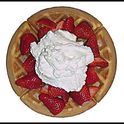Difference between dairy thermometer and candy thermometer
What is the real difference between a dairy thermometer and a candy thermometer? I know dairy one has capacity to read temperature till 220 and a candy thermometer can read till 400 or so. So, can we use candy thermometer where dairy thermometer is required. I have both. Just want to know the diff. thanks
10 Comments
Chef Ono- brilliant now I should never come up with this question as you have explained everything so much so in detail. I love to know technically everything before using it.
AJ - Hope you are doing good with your post-surgery thing. I have a thermometer below 85 F, which came in kit I had ordered. I think I might buy another one, soon.
Thank you for your kind words, Mindy. I don't believe anyone has ever asked me a question like that. Brace yourself…
You've probably noticed that I take a scientific approach to cooking. In addition to safety issues, I find accurate temperatures important for learning, understanding and repeatability.
First, allow me get a pet peeve off my chest: An accurate instant-read thermometer can be aquired for less than $5, a digital version for around $10. There is simply no excuse for not cooking with one for safety issues alone, yet only 10% of American households even own one, much less use it every time they roast a chicken. People ask me all the time how they can learn to cook better. My response is always the same: "First, buy a thermometer."
I actually don't have either a refrigerator or oven thermometer. The equipment is, however, calibrated using an air probe for my big Taylor.
#1 Thermapen Super fast and super accurate (calibrated to laboratory standards). Versatile enough to do 90% of all tasks. One-handed readings. If you just Googled "Thermapen" and screamed "Ninety bucks for a thermometer?!!!", I assure you it's worth it if you can afford it. If not, the one I carry in my sleeve pocket, a Taylor 9842, runs around $11.
#2 Taylor 9810 This is a two-handed thermocouple unit with interchangeable, cabled probes. As fast and as accurate as the Thermapen but can be outfitted with a surface probe which I use for reading griddle temperatures. You know how most people believe the first batch of pancakes is always a loss? Knowing the pan is precisely 350F is one of the two keys to getting them perfect every time. If I could have only one thermometer, this would be the one, but I've got 4 probes for it including a burger probe. (Hey, some people have more knives than they ever use, at least my thermometers get constant exercise.)
#3 ThermoWorks oven thermometer / timer. A decent roasting thermometer that will double as a candy thermometer (or whatever) with its optional clip. As with all inexpensive digital thermometers, this one uses thermistor technology which is not as quick as a thermocouple (not an issue in this case) and its accuracy can drift over time. But new probes are cheap (around $6) so it's not a major loss when you pinch the cable in the oven door or accidently broil one along with the roast.
#4 Maverick Oil and Candy Nothing fancy but it does the job. No cables and a splash shield are reasons to own one.
#5 El-cheapo Taylor analog dial thermometer, stained a deep mahogany brown from years of being stuck in the top vent of my Webber kettle when I'm smoking briskets and pork butt.
#6 Fluke Infrared Not very useful except in limited situations.
best,
mindy
An analog thermometer's accuracy can also be affected by its total range. All other things being equal, if one thermometer reads from, say, 0 to 400 and another reads from 100 to 300, even at center scale, the instrument with the narrower range will be more accurate -- and easier to read -- because the distance between the marks will be greater.
Aside from accuracy, candy thermometers usually have clips to hold them to the side of a pan, a dairy thermometer may be designed to float. Beside range, features like those set one type of thermometer apart from others. In my home kitchen I have 6 thermometers, all with specific purposes.
It makes a difference whether the thermometer is analog or digital. Analog thermometers tend to be most accurate in the center of their scale. Digital thermocouple thermometers should be accurate throughout their entire range.




